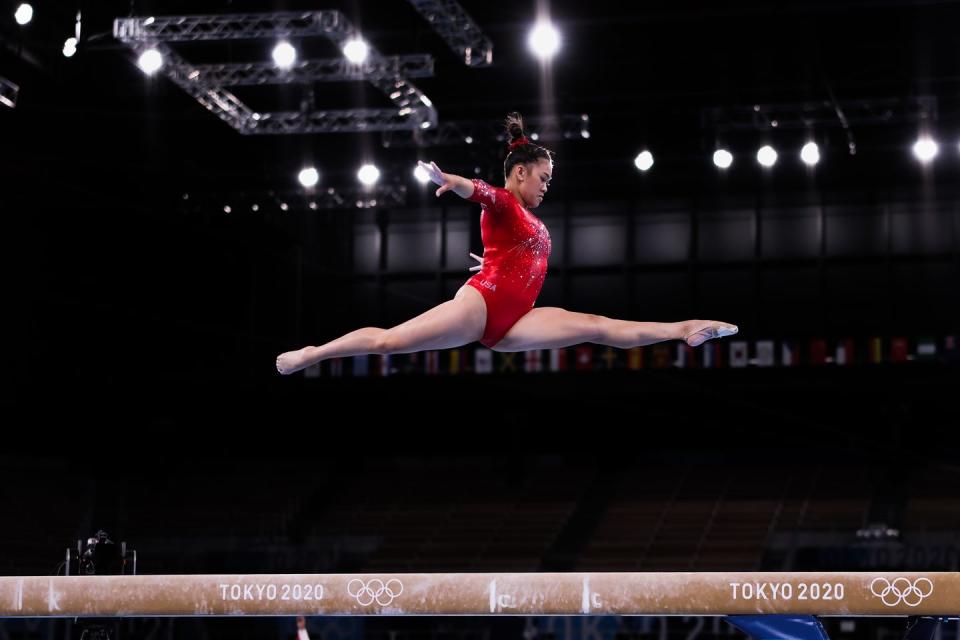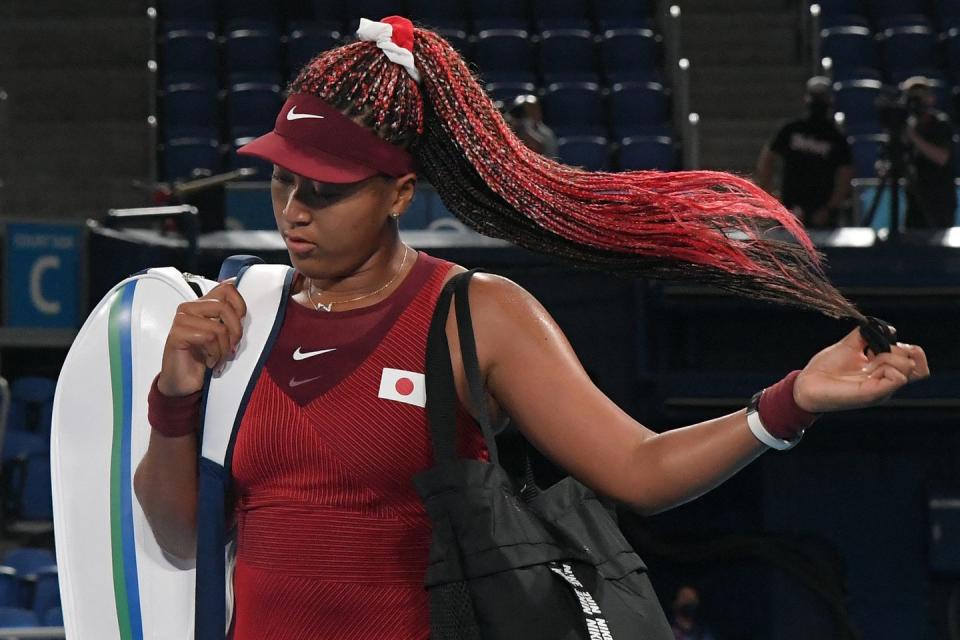Black Women Are Done Being Martyrs

- Oops!Something went wrong.Please try again later.
On May 25, 2020, Minneapolis police killed George Floyd, igniting a wave of protests for racial justice across America and beyond. Two years later, we're looking back with Pride & Protest, a package of stories about activism, the Black Lives matter movement, and the fight to change the world.
As Olympic medalists lined up for their medals ceremony Sunday night in Tokyo, among them was the inimitable Raven Saunders, who won silver in shot put. Standing on the podium with her medal around her neck and fans from around the world tuning in, Saunders raised her hands above her head and crossed her wrists, forming an X. In a post-ceremony interview, Saunders explained that the gesture represents “the intersection of where all people who are oppressed meet.” This was personal for Saunders as a queer Black woman who also intimately knows the struggles and stigmatization of mental illness. At 25 years old, Saunders has carried the weight of racism, sexism, and homophobia. And now, she bears the burden of calling those systems out.
There’s an ancient Greek story about Sisyphus, a cunning man who cheats death twice and, as punishment, is condemned to roll a large rock uphill that will always fall back down. Futile, thankless effort for all of eternity. In some ways, I’ve found Black people to be the world’s Sisyphus (minus pissing off the gods and deceit, of course). We’re guilty of nothing except surviving everything intended to kill us. We dig our feet into the ground and push that boulder uphill, hoping that our allies will at the very least keep it from retreating backward. And each time, we find ourselves atop that hill, alone, catching our breath before we descend to do it all again. Who helps us carry the load?

Saunders isn’t the only one under this pressure. In the last few weeks, swimmer Simone Manuel, gymnast Simone Biles, tennis star Naomi Osaka, and many other Black female athletes have been asked about their personal experiences within exclusionary athletic associations. In some cases, those questions also come with accusations of race-baiting or weakness—all while their white peers speak almost exclusively to their craft. It leaves many of us wondering, why is it that those with the most to lose are the only ones expected to address these problems head-on? More specifically, why do we expect Black women to dismantle systems of oppression that they didn’t create to begin with?
My first impression is that most people who are not on the receiving end of racism underestimate it. Either they can’t conceive of its breadth and depth, or they think that the facts sound like one big conspiracy theory. During moments of heightened activism, we all share a collective yet vague vision of a “better world,” but, like clockwork, the allyship fades over time until the only ones left standing are those most victimized by and vulnerable to systems of oppression like racism: Black people, women, queer and trans people, people with disabilities, those who don’t have the privilege of taking time off from the causes tied to their identities. And therein lies our problem.

Organizers and advocates will often say that those closest to the problems are also closest to the solutions, which is to say that the people in harm’s way have a critical vantage point into how oppression is materializing day to day. But that doesn’t mean we have the only vantage point. As Manuel shared in a podcast interview with Nancy Armour’s Changing the Game, “When I’m in a press conference and I’m asked, ‘Simone, you champion diversity, inclusion, and equality. Why is that important?’ I genuinely believe that every other swimmer that is next to me, whether they’re white, Black, Asian, they need to answer that question.” Creating more inclusive and equitable spaces is and should be treated as a team sport. The longer it isn’t, the longer we wait to achieve a more just future.
While prominent athletes have brought much-needed visibility to the uneven expectations placed on Black women, this problem is a chronic one that exists across sectors. Chatting with several Black women who are at the top of their respective industries about the unequal expectations they experience in the workplace, I know this to be true. Erica Lovett, the first head of diversity and inclusion for Cartier North America, has championed this work across the fashion world. When I ask about racial justice in the workplace, she says, “I personally think it is everyone’s responsibility to educate themselves on what is happening in the world, on history, and on the social and racial justice issues that continue to impact our country. Too often, those who have been historically excluded are the ones who are expected to lean in and lead the change.” She also acknowledges that this work often happens in people’s spare time and should be equally valued by their employers. “I would like to see more companies value the support of the employees who volunteer their time to lead racial justice initiatives. The best way companies can ensure that their underrepresented employees are not carrying the burden of this work is to hire dedicated internal and external resources.”
Taylor K. Shaw, the youngest CEO in the animation industry and a Black woman from the Southside of Chicago, knows this dynamic personally. “I, as one of the few Black women in the field, am expected to solve the problem of inclusion with a minor fraction of the resources,” Shaw shares. “Traditionally, we are taking on the job, especially at work, of educating those around us and trying to create a more equitable space. We do it and at times may find success, but it always comes at an expense—our time and energy. I myself have fallen victim to this, and on that journey, I've fallen sick several times.”
Zenab Keita, who currently works with sports media brand The Athletic and previously managed partnerships for the Golden State Warriors, knows personally what the athletics world is like for Black women effecting change. “During the 2020 racial justice reckoning tied to the murders of George Floyd, Breonna Taylor, and Ahmaud Arbery, many Black women in my network expressed that they were being tasked by their employers to provide input on official statements that their organizations would share externally,” she says. “It is a large burden that they felt they were only given in this special circumstance in order to protect the organizations—not actually empathize with Black people. It was also an incredibly difficult and exhausting ask, trying to linguistically corporatize their raw emotions while also trying to maneuver through the Black American experience at the time.”
What is clear is that while it’s important for racial justice work to be led by those most directly impacted, there is also a habit of leaning too heavily on the victims of bigotry to eradicate those harmful systems and behaviors. I ask Olympic rower Stephan Riemekasten about this phenomenon and his observations as a white man speaking about racial justice within a predominantly white sport. “We have one Black woman on the women’s team, Carlotta Nwajide, who competed at the Olympics in the [German] women’s quad. It has been disheartening to see her talk about racism in rowing, only to hear debates about her ‘politicizing’ her platform by white athletes that otherwise never engage in racial issues behind her back. The burden is heavily on her, when it should be everyone’s job to make sure the problems we face as a society won’t stay that way.” Riemekasten walked this walk when he launched #RowersAgainstRacism as an awareness campaign raising funds to support Color of Change, a racial justice organization. Keita echoes the importance of doing the work. “The bottom line is that if you want to be an ally, you’ve got to do more research, period. It is frustrating to hear well-intentioned friends of mine say, ‘I had no idea how bad it was,’ when discussing inequities or racism or racialized sexism, et cetera. How is that possible?”

After being asked about the role Riemekasten sees for himself and other allies in ensuring people like Nwajide don’t stand alone, he shares, “That would be my time to argue in her favor and dismiss those claims. As a white rower, the majority of my followers are other white rowers, so I find it helpful to also use my own voice and support [or] argue in favor of policies so that my followers see my own opinion—that it’s okay for white people to support, let’s say, reparations or adoption for single people. This is true especially in day-to-day conversations in exclusively white, male, able-bodied circles.” The message here is that marginalized people wouldn't need to bend over backward if they weren’t the only ones speaking up. And until that day comes, it’s clear that we Black women won’t be holding our breath.
Seeing highly visible Black women reject this expectation of martyrdom has been revolutionary across the board. Award-winning journalist Nikole Hannah-Jones recently made the decision to reject a hard-fought-for tenure offer from her alma mater, the University of North Carolina at Chapel Hill, and instead join the faculty of Howard University, a historically Black university. In a statement about her choice, Hannah-Jones famously stated, “At some point when you have proven yourself and fought your way into institutions that were not built for you, when you’ve proven you can compete and excel at the highest level, you have to decide that you are done forcing yourself in.” Her decision sent shock waves throughout academia and signaled what many have known to be true: Black women are done being the world’s mules.
Shaw sums this up powerfully when she shares, “We have watched our grandmothers and mothers work too hard. We've watched the stakes be too high for them to pause and take a break when needed. But now, when we have the room to say, ‘No, this request is beyond me,’ we are saying no. We are taking back our right to be human. That is powerful and I see it as a collective movement.”
You Might Also Like

